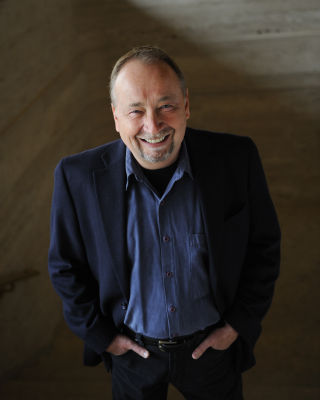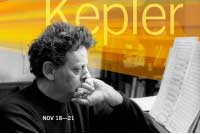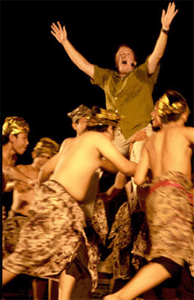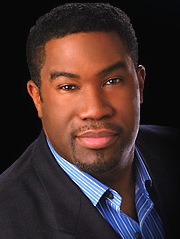The San Francisco Electronic Music Festival celebrates its 10th anniversary this week. On the final festival night, Saturday, September 19th, the program will include a special all-electronic performance of the opera I, Norton, by San Francisco Bay Area composer Gino Robair.
I, Norton is based on the proclamations of Norton I, Emperor of the United States and Protector of Mexico, who lived during the Gold Rush era in San Francisco. The concert begins at 8:00 p.m. at the Brava Theater Center, 2781 24th Street, San Francisco. Tickets are available online from Brown Paper Tickets.
 Gino Robair has created music for dance, theater, gamelan orchestra, radio, and television. His works have been performed throughout North America, Europe, and Japan. He was composer in residence with the California Shakespeare Festival for five years and served as music director for the CBS animated series The Twisted Tales of Felix the Cat. His commercial work includes themes for the MTV and Comedy Central cable networks. Robair is also one of the “25 innovative percussionists” included in the book Percussion Profiles (SoundWorld, 2001). He has recorded with Tom Waits, Anthony Braxton, Terry Riley, Lou Harrison, John Butcher, Derek Bailey, Peter Kowald, Otomo Yoshihide, the ROVA Saxophone Quartet, and Eugene Chadbourne, among many others. He is a founding member of the Splatter Trio and the heavy metal band Pink Mountain. In addition, he runs Rastascan Records, a label devoted to creative music.
Gino Robair has created music for dance, theater, gamelan orchestra, radio, and television. His works have been performed throughout North America, Europe, and Japan. He was composer in residence with the California Shakespeare Festival for five years and served as music director for the CBS animated series The Twisted Tales of Felix the Cat. His commercial work includes themes for the MTV and Comedy Central cable networks. Robair is also one of the “25 innovative percussionists” included in the book Percussion Profiles (SoundWorld, 2001). He has recorded with Tom Waits, Anthony Braxton, Terry Riley, Lou Harrison, John Butcher, Derek Bailey, Peter Kowald, Otomo Yoshihide, the ROVA Saxophone Quartet, and Eugene Chadbourne, among many others. He is a founding member of the Splatter Trio and the heavy metal band Pink Mountain. In addition, he runs Rastascan Records, a label devoted to creative music.
S21: His Imperial Majesty Norton I, Emperor of the United States and Protector of Mexico, is an “only in San Francisco” kind of personage. What inspired you to make him into the central character of an opera?
GR: He’s the kind of complex character one needs for an opera. And I like the fact that he’s mythologized somewhat.
Although many people see him as this incoherent, homeless vagrant, I think the reality is that he was bright man who was determined to make a difference in a world that was hostile, confusing, and often out of control. We’re talking about the Old West, here!
Remember, he was a Jewish immigrant from South Africa. Try to imagine the culture shock he experienced arriving in mid-19th-century California during the Gold Rush. It makes total sense to me that he’d conclude that the only way to solve the problems in his new environment was to roll up his shirt sleeves and do the job himself.
(more…)



 Philip Glass always does the unexpected. Or, as he said to me when we were talking on the phone about his subsequently Oscar-nominated score for Errol Morris’ 2003 The Fog of War, “I’m a bad person to interview because I never stay on the subject.” Well, yes and no. Yes, because Glass’s focus on the work in front of him is unflinching, and no, because his instincts always lead him to surprising solutions. His two-act 155 minute intermission-less new opera Kepler is yet another example of Glass’s wandering, yet disciplined, mind. Premiered at the Linz Opera by American conductor Dennis Russell Davies and his Bruckner Orchester Linz on September 20 2009 as part of that city’s celebrations as this year’s Cultural Capital of Europe, Kepler made the trip to Brooklyn smoothly, carrying a bit of history. Kepler lived in Linz, Mozart’s Symphony #36 was dedicated to it, Bruckner was choir director there — and two of the Nazis’ death camps — Mauthausen and Gusen, whose specialty was getting rid of the intelligentsia, were scant kilometres from its city limits. But then darkness is rarely far from light.
Philip Glass always does the unexpected. Or, as he said to me when we were talking on the phone about his subsequently Oscar-nominated score for Errol Morris’ 2003 The Fog of War, “I’m a bad person to interview because I never stay on the subject.” Well, yes and no. Yes, because Glass’s focus on the work in front of him is unflinching, and no, because his instincts always lead him to surprising solutions. His two-act 155 minute intermission-less new opera Kepler is yet another example of Glass’s wandering, yet disciplined, mind. Premiered at the Linz Opera by American conductor Dennis Russell Davies and his Bruckner Orchester Linz on September 20 2009 as part of that city’s celebrations as this year’s Cultural Capital of Europe, Kepler made the trip to Brooklyn smoothly, carrying a bit of history. Kepler lived in Linz, Mozart’s Symphony #36 was dedicated to it, Bruckner was choir director there — and two of the Nazis’ death camps — Mauthausen and Gusen, whose specialty was getting rid of the intelligentsia, were scant kilometres from its city limits. But then darkness is rarely far from light. …I hope not! They’re the last thing you need for this nine-part quest.
…I hope not! They’re the last thing you need for this nine-part quest. Old age isn’t for sissies or the timid and I think the same thing can be said about writing for the stage, especially if it’s the operatic one. It took Verdi years before he produced something that worked on the boards. Evan Ziporyn’s no stranger to the stage–he’s written and performed Shadowbang–and his new two-act 140 minute amplified opera
Old age isn’t for sissies or the timid and I think the same thing can be said about writing for the stage, especially if it’s the operatic one. It took Verdi years before he produced something that worked on the boards. Evan Ziporyn’s no stranger to the stage–he’s written and performed Shadowbang–and his new two-act 140 minute amplified opera  Gino Robair has created music for dance, theater, gamelan orchestra, radio, and television. His works have been performed throughout North America, Europe, and Japan. He was composer in residence with the California Shakespeare Festival for five years and served as music director for the CBS animated series The Twisted Tales of Felix the Cat. His commercial work includes themes for the MTV and Comedy Central cable networks. Robair is also one of the “25 innovative percussionists” included in the book Percussion Profiles (SoundWorld, 2001). He has recorded with Tom Waits, Anthony Braxton, Terry Riley, Lou Harrison, John Butcher, Derek Bailey, Peter Kowald, Otomo Yoshihide, the ROVA Saxophone Quartet, and Eugene Chadbourne, among many others. He is a founding member of the Splatter Trio and the heavy metal band Pink Mountain. In addition, he runs Rastascan Records, a label devoted to creative music.
Gino Robair has created music for dance, theater, gamelan orchestra, radio, and television. His works have been performed throughout North America, Europe, and Japan. He was composer in residence with the California Shakespeare Festival for five years and served as music director for the CBS animated series The Twisted Tales of Felix the Cat. His commercial work includes themes for the MTV and Comedy Central cable networks. Robair is also one of the “25 innovative percussionists” included in the book Percussion Profiles (SoundWorld, 2001). He has recorded with Tom Waits, Anthony Braxton, Terry Riley, Lou Harrison, John Butcher, Derek Bailey, Peter Kowald, Otomo Yoshihide, the ROVA Saxophone Quartet, and Eugene Chadbourne, among many others. He is a founding member of the Splatter Trio and the heavy metal band Pink Mountain. In addition, he runs Rastascan Records, a label devoted to creative music. San Francisco-based composer, conductor, writer, educator, and filmmaker
San Francisco-based composer, conductor, writer, educator, and filmmaker  Interpretations continues its twentieth season of provocative programming in New York City. Founded and curated by baritone Thomas Buckner in 1989, Interpretations focuses on the relationship between contemporary composers from both jazz and classical backgrounds and their interpreters, whether the composers themselves or performers who specialize in new music. To celebrate, Jerry Bowles has invited the artists involved in this season’s concerts to blog about their Interpretations experiences. Produced in tandem with La Mama ETC and Performing Artservices, the centerpiece of the series this year is a two-week, three opera, 10 performance, mini-retrospective of the recent works of
Interpretations continues its twentieth season of provocative programming in New York City. Founded and curated by baritone Thomas Buckner in 1989, Interpretations focuses on the relationship between contemporary composers from both jazz and classical backgrounds and their interpreters, whether the composers themselves or performers who specialize in new music. To celebrate, Jerry Bowles has invited the artists involved in this season’s concerts to blog about their Interpretations experiences. Produced in tandem with La Mama ETC and Performing Artservices, the centerpiece of the series this year is a two-week, three opera, 10 performance, mini-retrospective of the recent works of  Baritone Eric Owens is busy this fall – his Met debut as General Leslie Groves in John Adams’ Dr. Atomic is just a start to his performances this season in New York, Atlanta, London and Los Angeles.
Baritone Eric Owens is busy this fall – his Met debut as General Leslie Groves in John Adams’ Dr. Atomic is just a start to his performances this season in New York, Atlanta, London and Los Angeles.